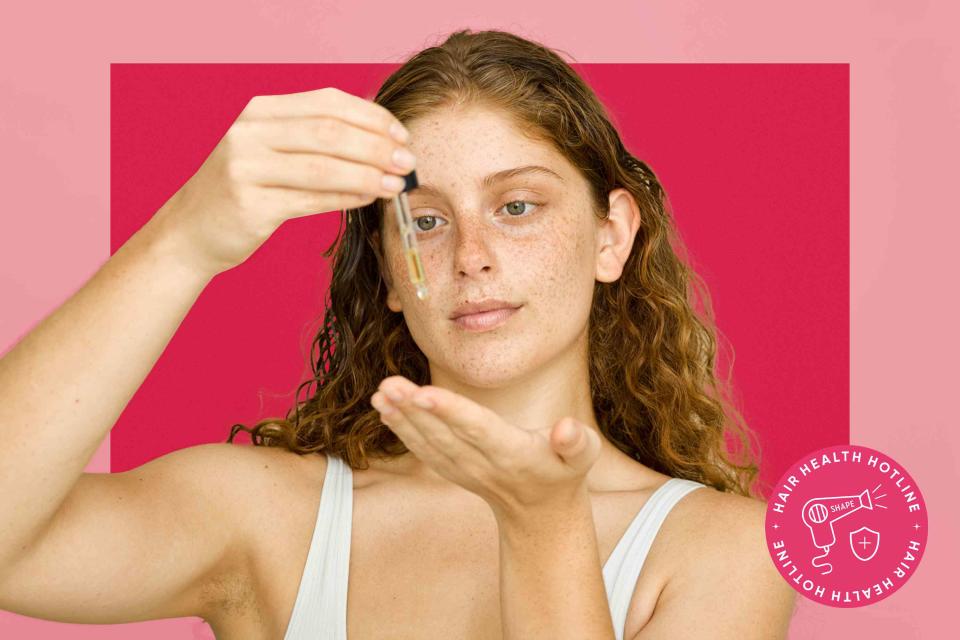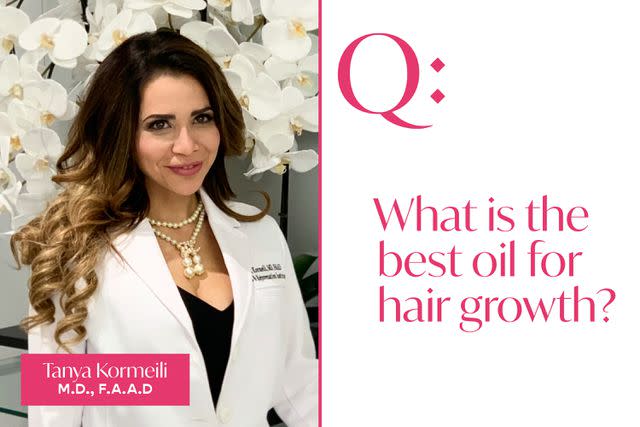Can Using a Hair Growth Oil Actually Reverse Hair Loss?
Find out which oils seem to be best for promoting hair growth, and why you might want to think twice before using one.

If you've spent any amount of time on the hair growth corner of TikTok, then you've gathered that slathering on oils is a popular approach among those who want fuller hair. Creators have been advocating for their favorite oils left and right, sharing before and after photos along with the specifics of their routines.
But even if you watch 20 of those videos back to back, you might be left with a few questions, e.g., "What are the best hair growth oils?" or "Are any of these benefits backed by research?" Below, answers to those questions and more, from Tanya Kormeili, M.D., F.A.A.D., a board-certified dermatologist in Santa Monica.
Q: I want to start using a hair growth oil but there are so many of them. What's the best oil for hair growth?
A: A few types of botanical oils may have hair growth benefits, based on existing research, according to Dr. Kormeili. However, oils won't necessarily help with all forms of hair loss, and they can potentially have negative impacts on your skin, she notes. Before you add a new product to your routine, the pros and cons of using a hair growth oil are worth considering.
The Benefits of Using a Hair Growth Oil
In general, oils contain vitamins and fatty acids and can help you maintain the moisture of your hair and scalp and prevent breakage. Certain oils — including rosemary, peppermint, and lavender oils — have research to back potential hair growth benefits, as Shape previously reported.

In one 2015 study on 100 people with androgenetic alopecia (a genetic hair loss condition), half the participants applied rosemary oil to their scalps over the course of six months, while the other half applied a 2 percent minoxidil product (a medication for hair loss). The rosemary seemed to be as effective as the minoxidil at increasing the number of subjects' hairs at the end of the six months.
:
Though peppermint oil seemed to help regrow mice's hair in a 2014 study, there isn't clinical evidence supporting that the oil can manage hair loss in humans, according to a 2020 review. "Research is limited, but peppermint oil could help hair growth," Craig Ziering, D.O., F.A.A.D., board-certified dermatologist and founder of Ziering Medical, previously told Shape. "Menthol, the main component in peppermint oil, has been shown to increase blood flow to the area where it is applied. Better blood circulation to the skin could encourage more hair to grow in the affected area."
In a 2016 study, researchers applied lavender oil to mice over the course of four weeks. They reported an increase in the number and depth of mice's hair follicles, suggesting that lavender oil may have hair growth benefits. Again, though, the results don't guarantee that lavender oil can provide hair growth benefits to humans.
Also worth noting, the act of massaging — whether you're kneading your scalp while applying an oil or another product — can boost circulation and thus encourage more hair growth, notes Dr. Kormeili.
:
The Drawbacks of Using Oils for Hair Growth
Before you try a hair oil for growth, there are a few possible drawbacks of using the products that you should be aware of. "A word of caution: Some oils can cause dandruff and when exposed on the face from hair contact, cause acne," says Dr. Kormeili. Castor and coconut oils, for example, can clog your pores, and clogged pores can result in a zit.
And if you have seborrheic dermatitis, a form of dandruff, it may be caused by an overgrowth of a type of yeast (Malassezia) that naturally lives on your scalp, as Shape previously reported. The yeast can feed off of oil on your scalp, which is why using an oil on your scalp for hair growth can be problematic if you're prone to dandruff.
:
The Bottom Line On Trying a Hair Growth Oil
Even if some oils can be beneficial for hair growth, they won't necessarily help with every form of hair loss, says Dr. Kormeili. "For example, if your hair loss is due to anemia [a condition that occurs when you lack healthy red blood cells] you need a blood draw to determine that and medical treatment to restore the hair," she says. "No oil can correct the anemia." That's why if you're experiencing hair loss, your first step should be to check with a doctor, who can help you figure out the cause of your hair loss, and in suggest a treatment plan, she says.
false

